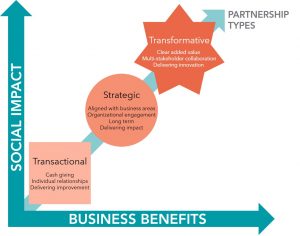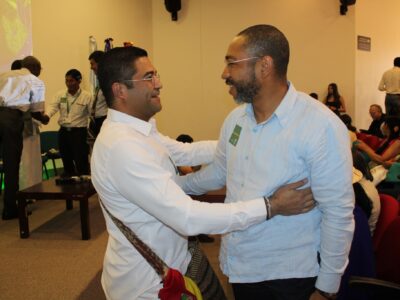

ACDI/VOCA aims to ensure our partnerships deliver both business and social impacts by co-creating around interventions that target broader changes within the market system. We look to build bilateral and multi-stakeholder partnerships that can deliver transformational change.
ACDI/VOCA has a growing portfolio of market systems development projects that engage with the private sector, industry chambers, and market research institutes using integrated partnership funds. These transformative partnerships are paying off in their ability to not only create systemic change in economic markets but also meet global development objectives. While coinvesting in shared development goals, our partnerships have generated more than $753 million in sales and leveraged nearly $1.6 billion. In this ongoing blog series, we’ll explore themes around engaging the private sector and share insights from peer learning exchanges with leaders from four ACDI/VOCA-led market systems development projects in Bangladesh, Honduras, Myanmar, and Kyrgyzstan, all of which operate partnership funds.
By design, we want all of our partnerships at ACDI/VOCA to be transformative for the market system as a whole, not just beneficial to one farmer or firm. The creation of these kinds of partnerships can be challenging to implement, however, requiring that we get it “right” across the fund design and management process from the start. We must design solicitations with an eye toward the end goal, pick the right partners, identify the most innovative ideas, and carefully manage the partnerships to achieve success.
Transformational partnerships are about shifting thinking and behavior away from engaging firms in one-off, transactional ways with a short-term mindset and toward leveraging the capacities and incentives of a portfolio of partners to create broader, longer-term change. For example, the Feed the Future Bangladesh Rice and Diversified Crops Activity used a portfolio approach to invest in transformational partnerships, including in the e-commerce sector, to spur more competitive commodity purchasing in rural Bangladesh and set the foundation for a national commodity exchange platform.
Facilitating Transformative Change
To stimulate learning between our projects and across the organization, ACDI/VOCA began hosting a series of peer learning exchanges with four of our market systems development projects. Part of the exchange allowed the teams to reflect on the various aspects of partnership design and management, resulting in a number of best practices for creating partnerships.

“We need to continuously ask ourselves and our partner what we need to make a partnership work before talking about the nature of support being provided.”
— Sergio Rivas (Right, in photo), Chief of Party of the USAID/Honduras Transforming Market Systems Activity
Best Practices for Creating Transformational Partnerships
Talk about the problem and solution early on during co-creation. Understanding the opportunity and collaborating on the solution before speaking about the monetary benefits a company may derive ensures we are partnering with the right organizations and creates alignment between the partner’s business goals and the project’s development objectives.
Internal processes and preparation are key to co-creation. Co-creation is an opportunity to strengthen staff and partners’ understanding of market systems approaches. By working hand-in-hand with the private sector, we can strengthen their understanding of what can be achieved beyond the outcomes of a partnership with one firm. Additionally, by participating in trainings on market systems development, private sector engagement, and funding mechanisms, project staff can become better prepared to engage with the private sector.

Invest in the people, not the idea. If you want to make progress with ideas at the firm-level, find the internal people with a history of success and work with them as lever points. Ensure multiple levels of buy-in from a company and show an interest and commitment to the partner achieving their goals early and often. Be clear about what you want to get out of the partnership from the beginning.
Be responsive, open, and willing to adapt and consider hiring liaisons or project staff from the industry you are targeting to create trust more quickly with market actors. Assuming your project has the flexibility, don’t be afraid to modify or drop a partnership if things are not going as planned. Be conscious of internal and external factors that are influencing the ability of a company to meet its intended outcomes and work with the partner to determine the best path forward.
Offer different types of organizational capacity support to help different-sized partners understand the strategic plan for their business. The initial value of providing technical assistance instead of just grants may not be immediately clear, so be prepared to provide a few examples of how this support can increase companies’ sales or another business metric.
“We need to think and talk in ways the private sector understands and simplify the process for engagement.”
— JoEllen McGann, Project Director, USAID Feed the Future Bangladesh Rice and Diversified Crops Activity (RDC)
Put yourself in the shoes of the private sector. To increase the quantity and quality of partnership applications, we need to think and talk in ways the private sector understands and simplify the process for engagement. The language used by the private sector is different from what we’re used to in the nonprofit space. Doing good is not their objective; the company’s bottom line is. Negotiations with businesses have a different “flavor” to them, and we need to account for what they want to get from the relationship and speak their language.
Co-creation is a process rather than a one-off activity. It’s an opportunity to develop a common understanding and steer firms toward sustainable, scalable activities and build their capacity to deliver. This begins at the initial engagement, starting the conversation off with an idea and creating opportunity for dialogue: “We think your technology is a game changer in Bangladesh and would be a good fit for our open competition process. What do you think?”
Coming Soon in the Engaging the Private Sector Series
Be on the lookout for the next blog in our series on private sector engagement exploring designing partnership grant funds to achieve systems change.
Read the second post in this series, “Funding for Transformation,” published April 19, 2021 here.
Comments









